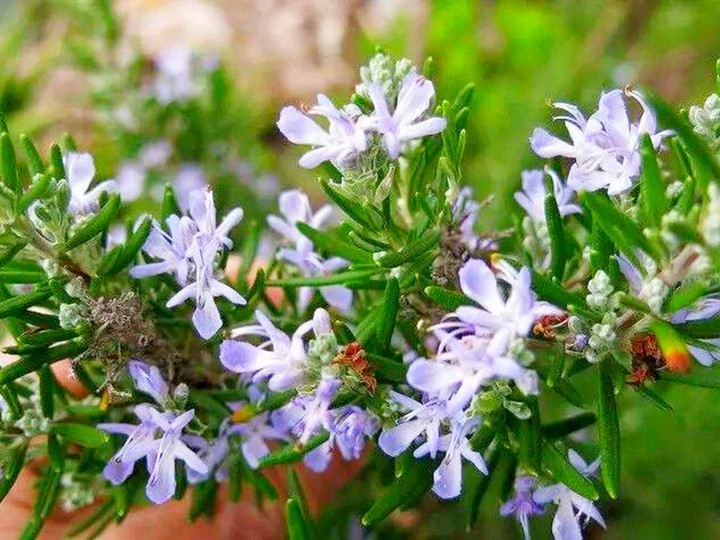Rosemary (Rosmarinus officinalis Linn. Family Labiatae) is a perennial culinary and healing plant native of the Mediterranean area. Rosemary was considered sacred by the ancient Greek, Roman, Egyptian, and Hebrew cultures. Rosemary extracts are used routinely for cooking, preservation of foods, cosmetics, or in herbal medicine for anti-inflammatory and antimicrobial applications, and for the prevention and treatment of diabetic and cardiovascular diseases, when used for food additives, it’s used for flavoring foods such as stuffings, pork, roast lamb, chicken, and turkey. Along with its culinary applications.
The extract of rosemary is supplied in the form of powder, liquid and oil. Rosemary extracts contain many bioactive components including phenolic mono-terpenes (α-pinene, camphene, limonene), diterpenes (carnosic acid, carnosol), flavones (genkwanin, isoscutellarein 7-O-glucoside), and caffeolyl derivatives (rosmarinic acid). The various benefits of rosemary contribute to their active substance of extracts.
Rosemary Oil
Rosemary oil’s herbaceous and energizing scent is frequently used in aromatherapy. Taken internally it helps to reduce nervous tension and occasional fatigue. Rosemary essential oil supports healthy digestion and internal organ function when ingested, is a common highly concentrated and distilled essential oil. It’s said to offer various benefits such as antioxidant, anti-inflammation, memory enhancement and hair growth, which has been used for cooking, cleaning, beauty, health, and other purposes.
Rosmarinic Acid
Rosmarinic acid is a stable and efficient food antioxidant, the antioxidant effect is 1-6 times stronger than BHT, BHA, PG, and better than other natural antioxidants such as tea polyphenols and vitamin E, which can effectively delay the oxidation of fats, improve food stability, and significantly extend the shelf life of fats and fatty foods by 2-3 times.
Rosmarinic acid is a natural and efficient antioxidant, can replace BHA and BHT and be used in animal and vegetable fats, dairy products, oil-rich foods, candies and baked foods to prevent the active ingredients in the products from being antioxidant, thus protecting the original color, smell and taste of the products. It can also be used as spices for a variety of soup and seasoning food; Besides the anti-corrosion and antibacterial effect, rosmarinic acid is more effective as an antioxidant in bulk oil whereas carnosol and carnosic acid perform better in oil-in-water emulsions.
Ursolic Acid
The other two main components are carnosic acid and ursolic acid, both of which are liposoluble. Ursolic acid is a powerful antioxidant. It has a positive effect on anti-aging skin freckles and pigment removal. Shampoo protects hair articles, can promote scalp blood circulation, improves hair loss, reduces the occurrence of dandruff and stimulate hair growth, moist hair. Ursolic acid has many sources such as Rosemary, hawthorn, ligustrum lucidum, white tongue grass, Prunella subtilis, plantain, kudingcha and other plants.
Carnosic Acid
Carnosic acid, a diterpenoid compound extracted from rosemary, has anti-cell mutation, anti-oxidation and anti-inflammation effects. The researchers say the antioxidant properties of carnosic acid can induce anti-inflammatory activity in the central nervous system, thereby acting as a neuroprotective agent. In addition, the antioxidant stress properties of rosemary extract may also play a neuroprotective role.
At Rainbow Biotech, we can provide Rosmarinic acid powder with content from 10% to 98%, For more information, call us now or send an inquiry!
- Dandelion Extract: What It Is, Benefits, Uses and Side Effect - April 23, 2024
- Is Berberine Extract Help For Weight Loss? - April 11, 2024
- Why Is Pysllium Husk Powder A Popular Meal Replacement Ingredient? - April 3, 2024



